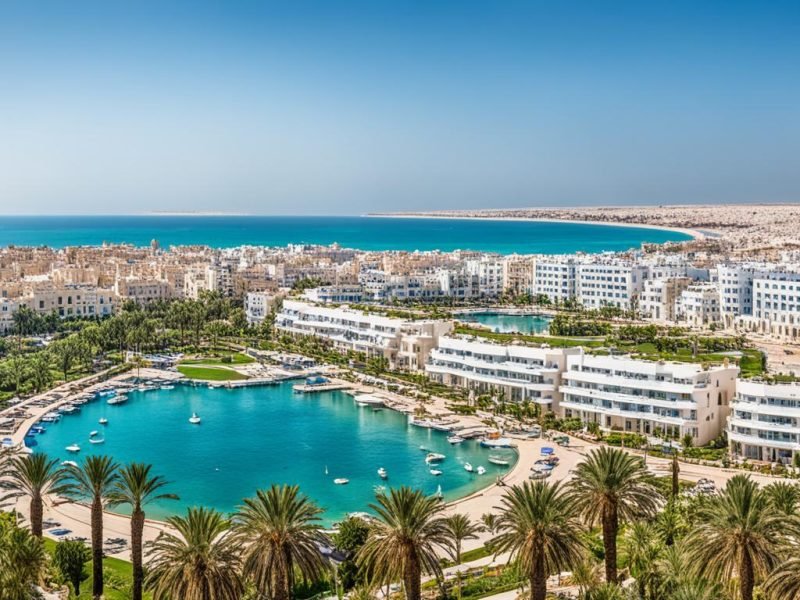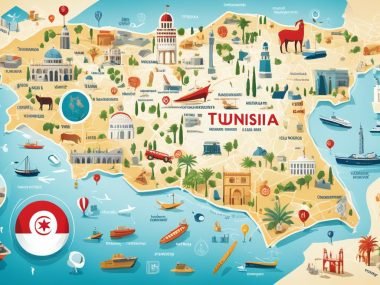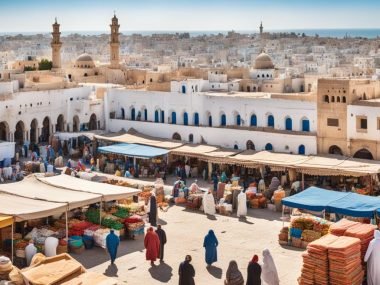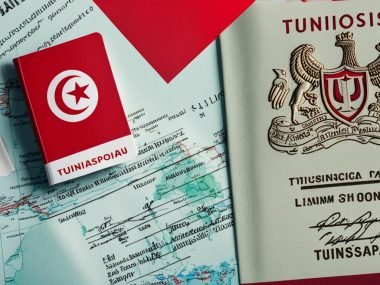When it comes to the allure of the Mediterranean, Tunisia stands out with its pristine beaches and unique cultural tapestry. I’ve personally observed how its charm has attracted numerous expatriates globally, often leading many to ponder over the legalities of purchasing land in Tunisia as a non-citizen. As someone deeply engrossed in the web of global real estate regulations, I can attest that Tunisia property ownership for expats comes with a distinct set of rules and requisites.
One significant aspect that foreign investors must understand is that while you can indeed purchase residential or commercial real estate in Tunisia, the country’s laws draw a clear line when it comes to agricultural land, which remains off-limits to non-citizens. Navigating through these legal nuances requires a thorough comprehension of the real estate regulations in Tunisia, coupled with the obligatory formalities that necessitate seeking local authorization and going through meticulous documentation.
In my journey through the intricacies of overseas property investment, I’ve found that knowledge is power—and for those looking to invest in Tunisian real estate, this rings particularly true. With that in mind, let me guide you through what potential investors need to know.
Key Takeaways
- Foreign investors can buy non-agricultural real estate in Tunisia, but not farmland.
- Authorization from the regional governor is required when purchasing property in Tunisia.
- Deposits made during the preliminary sale phase are refundable under specific conditions.
- Additional authorization from the Central Bank of Tunisia is necessary for non-residents.
- Understanding local real estate laws is crucial for expats looking to navigate the property market successfully.
- Engaging with professional notary services can facilitate a smoother real estate transaction process.
Exploring the Lure of Tunisian Real Estate for Foreign Investors
With its captivating combination of historical richness and modern allure, Tunisia has increasingly become a focal point for foreign investment in real estate. Here, against the backdrop of the Mediterranean, the prospect of buying property as a foreigner in Tunisia presents unique opportunities for immersion in a lifestyle that blends sun-soaked relaxation with cultural opulence. Let’s delve into the factors that make property purchase by foreigners in Tunisia not just an investment in land, but also in a way of life.
Tunisia, woven into the fabric of the Maghreb region, offers landscapes that range from the undulating peaks of the Atlas Mountains to the sweeping dunes of the Sahara desert, all edged by the tranquil Mediterranean Sea. Yet, beyond nature’s endowments, what has propelled the surge in foreign investment in Tunisian real estate?
Why Tunisia Attracts International Property Buyers
Without a doubt, Tunisia’s appeal to international real estate investors surges from its unique geographical offerings. The allure of owning a property where the cerulean expanse of the Mediterranean kisses golden sands is irresistible to many. The ease of access to both European and African markets adds another layer of attraction, along with Tunisia’s relatively straightforward process for non-citizens to own non-agricultural property. This confluence of beauty and potential for economic returns makes Tunisia a compelling choice for savvy investors from across the globe.
Appeal of Tunisian Culture and Mediterranean Lifestyle
The lifestyle in Tunisia goes hand in hand with the Mediterranean climate and healthy living. Tunisian cuisine is a tapestry of flavors, notorious not only for its affordability but also for its focus on fresh, high-quality ingredients—including the acclaimed extra virgin olive oil. Invest in a property here, and you’re investing in the nation’s rich cultural heritage as well, reflected in its vibrant music, aromatic jasmine-scented streets, and the warmth of its people.
The city of Sfax, Tunisia’s second economic center, encapsulates much of what drives foreign investment within its borders. Boasting flourishing industries and educational institutions, Sfax is not just a cultural hub but also an economic powerhouse—rife with opportunities for those looking to set roots in a place that promises both business growth and an understanding of Tunisia’s enchanting way of life.
| Feature | Appeal to Foreign Investor |
|---|---|
| Mediterranean Coastline | Stunning natural vistas, serene lifestyle |
| Cuisine | Rich flavors, healthy and fresh ingredients |
| Cultural Heritage | Deep historical roots, vibrant local customs |
| Economic Potential | Industrial growth, burgeoning business opportunities |
In sum, the real estate market in Tunisia offers much more than just property—it’s an invitation to a lifestyle that is both distinctly Tunisian and universally appealing. Whether it’s serene coastal living, a rich cultural experience, or promising economic prospects, Tunisia stands as a beacon to foreign investors around the world.
Understanding the Legal Framework for Foreign Land Ownership in Tunisia
As a professional invested in demystifying the complexities of real estate law, I’ve come to recognize that understanding land ownership laws in Tunisia is essential for any foreign investor eyeing this Mediterranean gem. With the gleaming promise of its prime coastlines and rich history, Tunisia offers lucrative prospects. However, delving into the legal territory reveals nuanced restrictions and procedures that must be navigated with precision. Before setting your sights on the vibrant scenes of Tunisia for investment, it’s crucial to comprehend the guidelines that govern foreign land ownership rights in Tunisia.
Tunisia’s Land Ownership Laws: A Guide for Non-Citizens
In exploring the Tunisian real estate landscape, I’ve unearthed that while the beckoning of residential and commercial spaces is attainable for foreigners, an unyielding boundary is drawn around agricultural assets. The intricacies involved in the purchase process underscore the importance of grasping the prevailing land ownership laws in Tunisia—particularly those aimed at non-citizens wishing to own a piece of this vibrant land. It’s a path laden with legislation, where each stride taken must be done so under the watchful governance of legislation that meticulously delineates the do’s and don’ts for foreign investors.
Navigating Property Purchase Procedures as a Foreigner
Staring down the path of property procurement in Tunisia entails grappling with an array of procedural demands. My advice to aspirants looking to call a corner of Tunisia their own? Begin with the essential step of securing permission from the governor—a mandate without which one cannot hope to proceed. This gateway clears the road towards engaging with the Central Bank of Tunisia, a venture that calls for establishing a local bank account prepared to embrace either foreign currency or those coveted convertible dinars.
It doesn’t end there—for within a short span of 48 hours post funds transfer, a written declaration detailing the investment intent must be sanctioned. It’s a race against time incumbent upon swift, deliberate actions and accurate paperwork. However, for those fortunate to be furnished with residence permits, the course eases somewhat, with the focal document distilled to a singular declaration of investment from the concerning bank holding the purchase sum.
| Action | Objective | Centrality to the Purchase Process |
|---|---|---|
| Securing Governor’s Permission | Initial clearance for property purchase | Critical – irreplaceable first step |
| Engaging with Central Bank | Obtaining financial authorization for non-residents | Essential – bridges financial transactions |
| Opening a Local Bank Account | Facilitating the transfer of purchase funds | Practical – enables foreign investment |
| Acquiring Statement of Investment | Justifying the transfer of funds for property acquisition | Requisite – ensures compliance and investment transparency |
| Simplified Process for Residents | Easing the paperwork for those with residency | Advantageous – streamlines procedure for residents |
This consonance of legality and procedural know-how serves as the backbone for any successful real estate investment in Tunisia by foreigners. The tantalizing prospect of owning Tunisian property is tempered by a structured protocol—one that demands respect for the land, an understanding of its people, and rigorous conformation to its rules.
Can Foreigners Buy Land In Tunisia? Analyzing the Current Regulations
As I delve into the nuances of real estate regulations in Tunisia, it becomes apparent that the legal framework is tailored to encourage foreign investment in specific sectors while maintaining restrictions in others. Understanding the legalities of purchasing land in Tunisia as a non-citizen is essential. Tunisia, much like other sovereign nations, has put in place regulations to ensure that its agricultural heritage remains within the hands of its citizens.
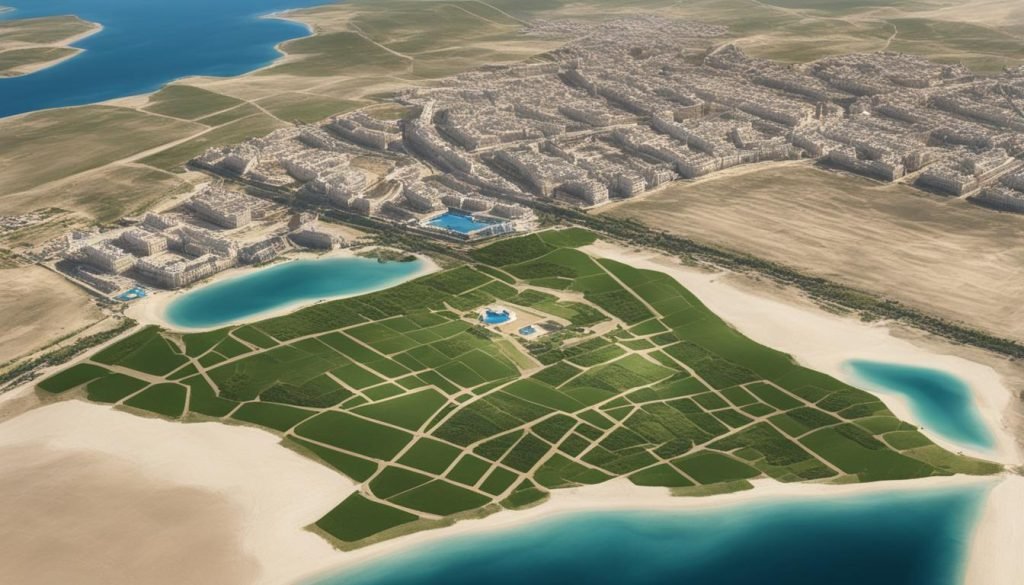
However, it’s not all rigidity and barriers; the Tunisian government has crafted exceptions that foster a more open investment climate, particularly in areas with high economic potential. Law no. 40 of May 11, 2005, stands as a testament to this shift, where it waives the need for a governor’s authorization for foreigners investing in industrial or touristic developments—underscoring a key legislative amendment aimed at enriching Tunisia’s attractiveness to international investors.
Understanding the regulatory climate is the first step for foreign individuals and businesses looking to partake in Tunisia’s real estate market.
Let’s examine these exceptions more closely:
| Area of Investment | Requirement for Governor’s Authorization | Legislative Measure |
|---|---|---|
| Residential/Commercial (Non-Agricultural) | Yes | General Tunisian Real Estate Law |
| Industrial | No | Law no. 40, May 11, 2005 |
| Touristic | No | Law no. 40, May 11, 2005 |
| Agricultural | N/A – Prohibited for Foreigners | General Tunisian Real Estate Law |
For a non-citizen pondering the idea of owning a slice of the Mediterranean heaven, this nuanced but investor-friendly environment can be appealing, albeit with certain guideposts to steer by. These regulatory contours are part and parcel of Tunisia’s broader economic vision, which endeavors to marry foreign capital with local insight—welcoming investments in sectors deemed pivotal for national growth.
Maintaining keen awareness of these regulations is paramount. I have witnessed firsthand the benefits reaped when foreign investors align their objectives with the welcoming arms of Tunisian policy. Engaging with legal experts in this domain not only streamlines the property acquisition process but also unearths potential for fruitful investment in this North African oasis.
Steps to Acquire Residential Properties in Tunisia for Expatriates
Embarking on the journey to secure a property in Tunisia can be a rewarding endeavor for expatriates. However, it necessitates an in-depth understanding of Tunisian regulations regarding property purchase by foreigners in Tunisia. Let’s walk through the process that ensures smooth navigation through the legalities and essential steps one must undertake as an interested buyer from another country.
Pre-Purchase Formalities: From Permission to Property Registration
The pre-purchase formalities for Tunisia property ownership for expats start with obtaining permission from the regional governor. This is a fundamental step as it sets the stage for all subsequent proceedings. Without this authorization, no foreign investment in residential real estate can materialize.
Next is the critical act of drafting a preliminary deed of sale. This document outlines conditions such as timeframes and deposit details. A deposit, which represents a commitment to the property, usually reflects a percentage of the property’s total price. This deposit is recoverable should the sale not reach completion for a justified reason. Such meticulous details are part of the preliminary agreement that protects both buyer and seller in the real estate transaction process.
The Role of the Governor’s Approval in Property Transactions
Securing the governor’s approval is not merely a procedural formality; it is an indispensable part of the property acquisition journey in Tunisia. The governor’s authorization acts as a gatekeeper to subsequent legal requirements and is essential in affirming the validity of the transaction for a foreigner wishing to invest in Tunisian real estate.
| Step | Description | Significance |
|---|---|---|
| Permission from Governor | Obtaining approval for purchase intent | Initial legal clearance for transaction |
| Preliminary Deed of Sale | Drafting a legally binding purchase agreement | Outlines the conditions and commitments before official sale |
| Deposit Provision | Providing financial commitment | Acts as a security measure for both parties |
| Official Registration | Finalising the legal transaction and property registration | Cements ownership and is mandatory within sixty days post-approval |
Upon the governor’s approval, the official stage is set where the final contract of sale is drawn up to solidify the purchase. This contract must undergo proper registration within sixty days of its stipulation. If the purchaser is a non-resident foreigner, this stage also requires a declaration of investment or proof of residency to complete the registration process. Such robust frameworks ensure that property purchase by foreigners in Tunisia meets both the buyer’s aspirations and the country’s regulatory standards.
The Necessity of Central Bank of Tunisia’s Approval for Non-Residents
Investigating deeper into the process of acquiring property as a foreigner, I’ve come across the pivotal role of the Central Bank of Tunisia in foreign investment in Tunisian real estate. The buying journey for non-residents entails not only finding your dream property but also adhering strictly to the financial regulations set forth by the Tunisian authorities. In this section, I’ll outline the crucial steps and regulations that are integral to ensuring a transparent and lawful property transaction within Tunisia’s promising real estate sector.
It’s critical for non-resident investors to navigate the financial landscape of Tunisia with diligence, particularly when the goal is purchasing a piece of the Mediterranean paradise. Let’s break down the central procedures and their significance to the non-resident investor’s journey.
Opening a Tunisian Bank Account and Currency Regulations
The first step for a non-resident eyeing real estate in this North African nation is to establish a banking relationship with a local institution. Opening a Tunisian bank account is not merely a transactional requirement; it’s the foundation upon which the rest of the purchasing process is built. Whether it’s in foreign currency or convertible dinars, the account becomes the nexus through which the incoming funds for the property purchase will travel.
A noteworthy aspect in this procedure relates to currency regulations. The intricacies of these regulations are crucial for a foreign investor to grasp to ensure that the financial operations are effectively and lawfully administered. Conforming to these currency guidelines is not optional but a strict necessity for the authorization by the Central Bank.
Ensuring Transaction Transparency Through Bank Transfers
One of the cornerstones of foreign investment, especially when it involves substantial decisions like real estate acquisition, is transaction transparency. In the context of Tunisian property purchase, the clear trail of money transfer is not only a matter of legality but also one of future convenience and proof. A statement detailing the investment reasons for the transfer is a required document retrieved from the Tunisian bank, establishing the legitimacy and clear intent of the funds’ pathway.
If the required statement is not provided, the stakes are high as this documentation is pivotal for the resale of the property, should the investor choose to liquidate the asset in the future. In such instances, a certificate stating the reasons for the omission must be issued by the bank. This ensures a protective layer for the investor against potential legal and financial complications down the line.
In my direct experience with foreign land ownership rights in Tunisia, adhering to these fiscal protocols is a powerful testament of commitment to upholding the nation’s economic standards. In embracing these practices, non-residents not only secure their investment but also contribute to the narrative of responsible foreign investment in Tunisian real estate.
Thus, for those looking abroad for real estate opportunities, armed with this knowledge, Tunisia stands as a beacon of potential.
Investing in Sfax: The Second Economic Pole of Tunisia
As a devoted connoisseur of global investment landscapes, I’ve observed that foreign investment in Tunisian real estate has experienced a remarkable uptick, predominantly in the economic hub of Sfax. This vibrant city is propelled by an economy that is diverse and burgeoning, making investments in Sfax not merely a financial endeavor but a strategic foothold in the North African market. Textile, food production, mechanical engineering, and chemicals form the core of Sfax’s industries, creating a fertile ground for investment opportunities.
The financial and banking network in Sfax is exceptional, boasting 145 bank branches that offer comprehensive services to support business activities. This robust infrastructure is pivotal for the successful establishment and growth of enterprises by foreign investors. Investing in Sfax means tapping into Tunisia’s second-largest economic center, renowned for its significant contribution to national production, especially olive and almond oil, which account for 40% and 30% of Tunisia’s output respectively. This production prowess underscores Sfax’s status as a prime location for foreign investment in Tunisian real estate.
Moreover, the 20 higher education institutions in Sfax, hosting approximately 43,000 students, ensure a continuous influx of skilled talent to the workforce, an asset that is incredibly valuable for any investor considering establishing a presence in the region. The confluence of industry, education, and financial stability makes investing in Sfax a wise decision for those looking to make an indelible mark on the Tunisian economic landscape. As I reflect on the opportunities that Sfax presents, I’m convinced that it stands out as an exemplary model of growth and potential within Tunisia.

